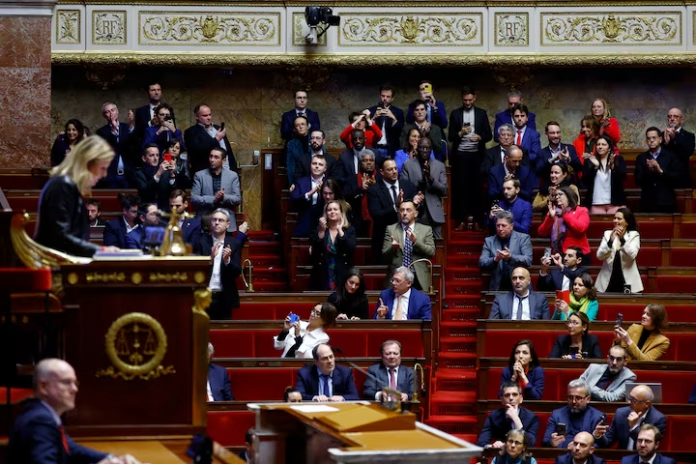France’s govt collapses after no-confidence vote sparks political crisis
The French government collapsed on Wednesday after losing a no-confidence vote, thrusting the euro zone’s second-largest economy further into political crisis, and threatening its capacity to legislate and repair its precarious finances.
This is the first French government to be forced out by a no-confidence vote since 1962.
The euro showed little immediate reaction, trading around $1.0517 against the dollar, but dipping against other European currencies, such as the Swiss franc and the pound.
French stock and bond futures nudged up modestly.
READ ALSO: Impeachment Rocks NUJ FCT Council: SEC takes over after ‘Vote of No Confidence’
The country’s bonds and stocks have come under selling pressure from the escalating crisis in recent days, with the closely-watched gap, or spread, between 10-year French and German bond yields rising to as much as 90 basis points, its widest since the height of the euro zone debt crisis in 2012.
JAMES ATHEY, FIXED INCOME MANAGER, MARLBOROUGH, LONDON said: “This was not an unexpected event.”
“But it is going to nag at investors until we have clarity and we can’t have clarity until July.”
“Austerity is better from a pure OAT investor perspective but it is likely to reduce support for the centre (parties) and that reduces the chances of a market-friendly outcome in an election next summer.”
“There’s nothing likely to make the outlook materially worse in the short term and (French bond risk premia) is likely to chop around in the range it has been.”
“When we get into the new year and people take a fresh look it could drift wider.”
MATHIEU SAVARY, CHIEF INVESTMENT STRATEGIST, BCA RESEARCH, MONTREAL stated; “Paralysis will remain the dominant feature of French politics for the next two years, which means that the debt is unlikely to be fundamentally addressed. So we will remain in an environment of volatility around French bonds.
That to me means there is still not enough protection embedded in the current level of spreads. So that’s why I don’t recommend my clients buy French bonds. I think Spanish bonds are more attractive.
If we move to 100 bps in terms of spreads here, based on my conversations with investors, it’s likely that we’ll see a bit of a rally in French bonds at this level, but very short-lived, it’s not the end of the travail.
We’ll remain in that ‘elevated spread and high volatility’ no matter what. So that’s why I’m not keen on French bonds at all.”
“The potential threat rather to the credit rating of France is something that will keep investors at bay and prevent a significant narrowing (in the risk premium). Because here, the odds that France is being downgraded are rising since the political paralysis means that anything meaningful, any meaningful moves to decrease the deficit, will be challenged.”
NICK REES, SENIOR FX MARKET ANALYST, MONEX EUROPE, LONDON said; “I’m amazed the euro hasn’t moved much. The French government has collapsed. It should be lower.”
“There are two major powers in Europe, France and Germany, both of which right now are emasculated.”
“I don’t see that as a good position to be in when (U.S. President-elect Donald) Trump is coming into office and probably going to hit Europe with tariffs. I don’t like that risk environment and the euro shouldn’t like that risk environment. It should be trading a lot lower.”
“Some of this was expected but markets haven’t got around to the realisation that is really bad.”
“This is a big blow to sentiment in France and that will be negative for growth.”
Follow the Neptune Prime channel on WhatsApp:
Do you have breaking news, interview request, opinion, suggestion, or want your event covered? Email us at neptuneprime2233@gmail.com





